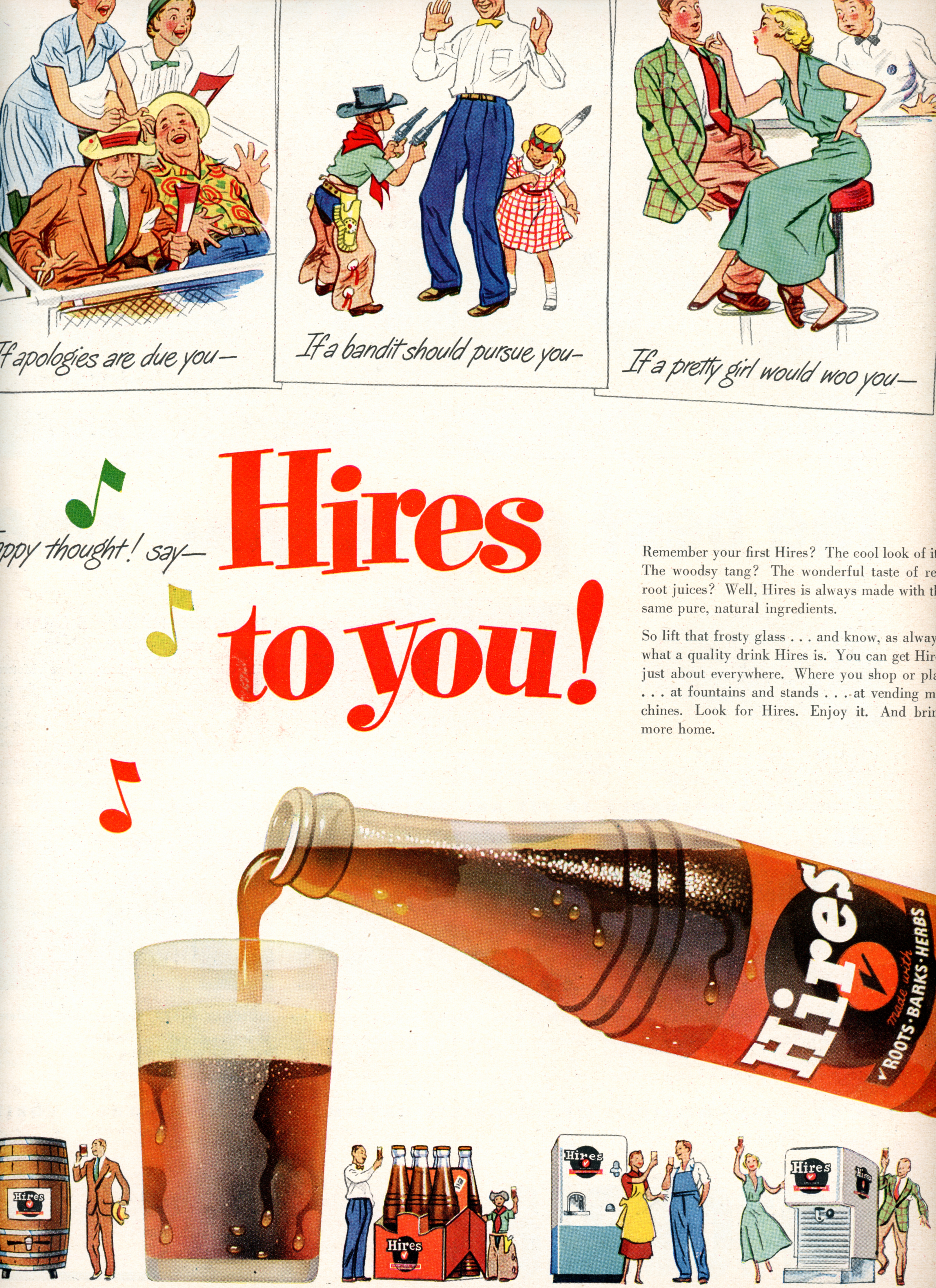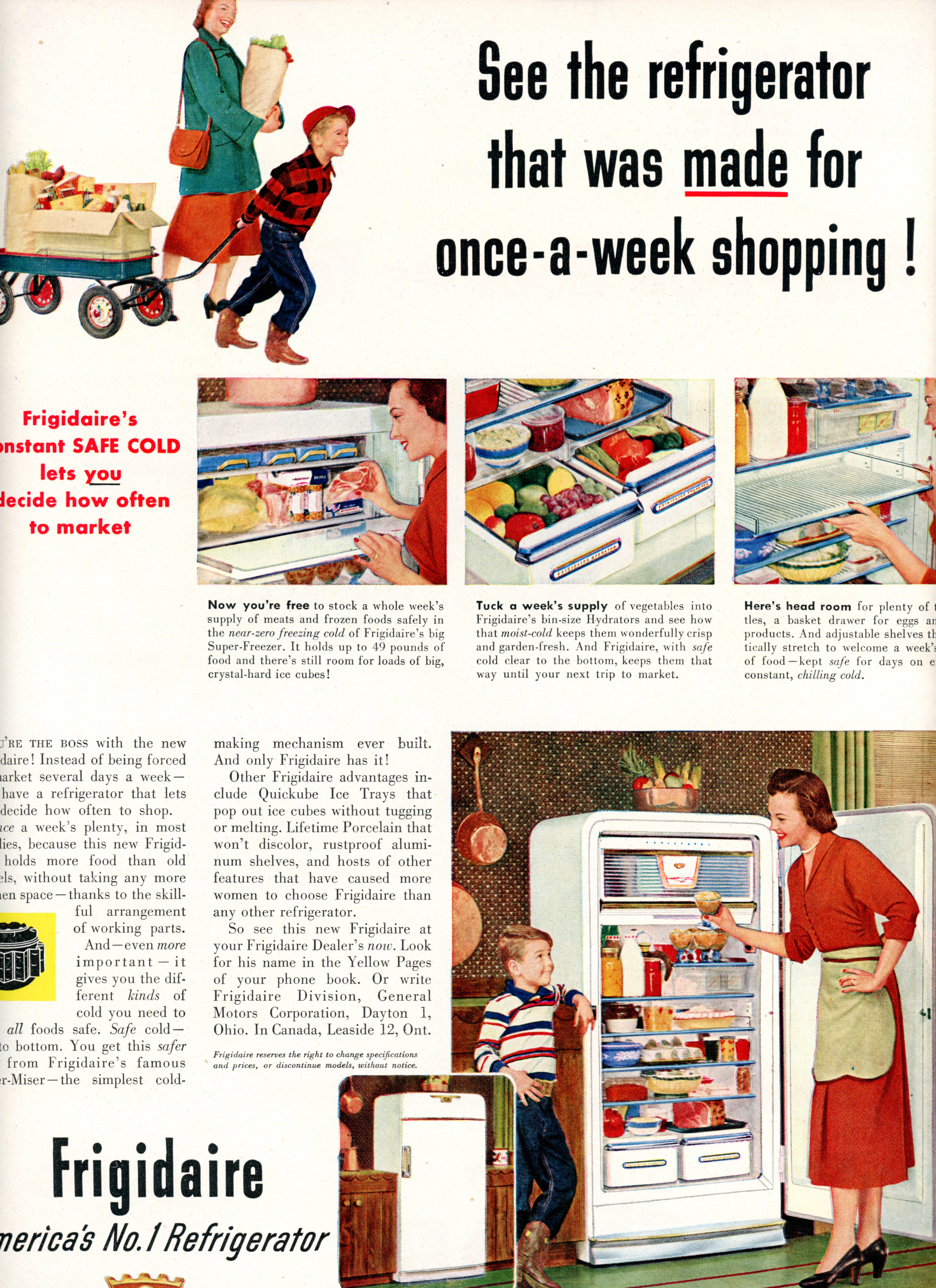You remember, about a decade ago, when Christina Tosi’s Milk Bar was all the rage. The pastry chef latched onto Momofuku’s rising star—first, in 2005, as a food safety consultant—and soon found herself slinging an irreverent selection of experimental sweets at David Chang’s trendy establishments (which, until that time, had resisted selling dessert).
2008 saw the opening of Tosi’s first dedicated Milk Bar location. That grew to nine brick-and-mortars by 2012, a year that also saw the store’s founder earn a James Beard Award for Rising Star Chef of the Year. She capped that honor off with another—the James Beard Award for Outstanding Pastry Chef—in 2015. Tosi had, by then, expanded the business to Toronto and Washington D.C.. Today, that has grown to include locations in Las Vegas, Los Angeles, and Boston to boot.
It is hard to think of a more meteoric rise in the history of American pastry, but—now that the sugar rush has subsided—to what degree is Milk Bar’s success merely a consequence of good branding? And why should any community welcome a bakery that has proven itself to be a craven seeker of profits at the expense of both quality and the guest experience?
Look—once upon a time, you were the sort to get excited about Tosi’s sweet treats. She had been crowned an undeniable genius by the monolithic, Manhattanite food media establishment. Yet, to the unwashed masses in the Midwest (such as yourself), her desserts seemed so eminently eatable. The cakes, pies, and cookies had little to do with traditional pâtisserie—despite Tosi’s pastry arts training at the French Culinary Institute—as you knew it. Rather, her creations accessed a shared American nostalgia, a homespun feeling that conjured the baked goods one’s family might have made during childhood. Is it fair to say we’ve all been hoodwinked?
To be clear, this article is not so much a critique of Tosi’s recipes. About a decade ago, you remember excitedly placing your first order to have a 10-inch Milk Bar Birthday Cake delivered to Chicago. The thought that—thanks to Next Day Air shipping—you could share an expression of Momofuku’s “magic” with friends and family positively thrilled you as a budding “foodie.” Two months after that inaugural taste, you shipped yourself some of the B’Day Truffles and an assorted selection of the bakery’s cookies. Three or four months after that, you secured another Birthday Cake (this time, the more petite 6-incher) and a Caramel Apple Pie to boot. Finally, one month later, you placed your last ever order for some more B’Day Truffles, a Crack Pie®, and a Candy Bar Pie.
Then, for whatever reason, you never showed the damnedest interest in Milk Bar ever again. There was nothing obviously wrong with any of your experiences—the items you ordered had arrived on time and delighted your guests. But the mystery was now gone. And, after eating—perhaps—a bit too much of a leftover Birthday Cake by yourself, Tosi’s recipes revealed themselves to be strikingly ordinary.
You can only really compare the experience to those couple occasions where you have inordinately craved marshmallows. Sitting down with a bag of Jet-Puffed jumbos, you would savor the first three, four, or five of the spongy confections straight from the bag in a state of giddy delight. By the time you chewed on mallows six, seven, and eight, though, something had clearly changed. Still, that bag of Jet-Puffed was your special treat. You would charge ahead towards marshmallow number nine, ten, eleven. By the time you reached an even dozen, you felt as though you couldn’t stand seeing the sweets ever again. What you imagined to be an incomparable indulgence amounted to a sickly sort of torture. The marshmallows’ novelty—perfect for the occasional bite of s’mores—had been stripped away. In concentrated doses, the dessert was downright repugnant. And that is the same sensation you ultimately felt with Tosi’s full suite of products.
Surely, this disgust threshold exists for every comestible—one either grows tired of eating, in accordance with satiation, or veers towards some advanced form of digestive distress. But the question here is not one of physiological “fullness” but, rather, palate fatigue. You can gorge yourself along with the best of them upon coming face to face with a superlative expression of deliciousness. But Milk Bar tested your limits in an unfamiliar way. After more than one or two slices (of pie or cake), one or two cookies, or a few cake truffles, Tosi’s recipes transformed into something utterly abominable. They revealed themselves to be dastardly deluges of sugar without the slightest depth of flavor, the equivalent of processed desserts dressed up in a kooky, homespun aesthetic.

But writing an article complaining about how Milk Bar desserts are too sweet would be like wringing your hands about how soda pop is “too sweet.” Concentrated expressions of sugar are an unfortunate cornerstone of an overly processed American food system, and Tosi’s creations cleverly exploit our ingrained, childlike nostalgia for direct doses of sucrose. Milk Bar’s goods are designed to deliver superficial pleasure to the widest portion of the population possible. And, surely, it is the brand’s sparse, deconstructed designs that have made their products such a hit with all those who “eat with their eyes.”
Yes, you think it is perfectly fair to contend that a James Beard Award winner should do more to expand Americans’ palates. Recipes that, in 2005, signified a resistance to ostentatious European baking tradition now read as being woefully backwards. Tosi is not a champion of American ingredients or of heritage techniques. She has done little to cultivate her fellow citizen’s appreciation of baked goods, to advance domestic cookery, or even to encourage more moderate, healthy consumption patterns. Instead, her products are riddled with preservatives and succeed primarily as fodder for social media.
Milk Bar’s success stands as a testament to Tosi’s mastery of self-branding, her support from traditional food media’s elite during the last years of their relevance, and the emergence of a social media model that prizes products of style over substance. It has little to do with anything approaching culinary merit—and can that be any surprise when the business refers to itself unironically as a “dessert empire and lifestyle brand?” But, as you admitted, Milk Bar’s products had caught your eye, too, long ago. And it would be hypocritical to judge other consumers who fall for the marketing hype and easy pleasure offered by the creations.
Instead, this article concerns the manner in which Milk Bar is run. You will not decry Tosi for successfully marketing her subpar products to the population. However, when those treats come at the cost of ruined celebrations—when moving mass amounts of orders takes precedence over customer service—you think some manner of advocacy is in order.
That is not to mention the fact that Tosi has long been scouting Chicago as the latest home for one of her diabetic death chambers. In 2019, the pastry chef revealed to Eater Chicago that “Chicago is more likely in our [Milk Bar’s] future [relative to other rumored cities like Miami]—a year, two, three out, but we love the city and would be honored to one day call it home—the Midwest is where it all began for me, after all.”
Tosi had already slung her desserts at Lollapalooza in 2016, and 2019 also saw Milk Bar pop up at Wicker Park’s Big Star for two days. The latter collaboration—part of a “larger national tour”—was based in cities “where they get the most requests to open a bakery.” A Milk Bar representative also revealed that “Chicago is among the most popular markets on its eCommerce site” (with some thanks, ashamedly, due to those orders you placed back in the day).
Tosi’s love of the Windy City is so great that she sued River North business JoJo’s Milk Bar—which opened in February of 2019—for trademark infringement. The “empire,” in discussing the action, claimed that their goal was “to eliminate any confusion for customers…[and] protect the integrity of the Milk Bar brand and product from outside parties who are allowing and/or promoting an association with us, whether intentional or not.”
While JoJo’s resisted the lawsuit—claiming, you think, correctly that “milk bar” is a generic term for purveyors of dairy desserts—its utilization of the signature “milk” script proved too close for comfort. As did the moniker “JoJo” itself—which Milk Bar claimed was derived, in some manner, from “Momo” and the company’s prior identity as “Momofuku Milk Bar.” Local media and customers alike had, indeed, mistaken Tosi’s brand for the Chicago upstart. They came expecting Crack Pie® and the famous Birthday Cake but found only cocktails, sandwiches, salads, and shakes—the latter which took their lead from New York’s Black Tap far more than they did Tosi.
JoJo’s Milk Bar has since become JoJo’s Shake Bar, and you think that is good news for consumers. If someone desires to stick sickly sweet garbage down their gullet, you suppose they should be able to secure just the lifestyle approved™ variety of trash they are after. Other Milk Bar “copycats” over the years have included Burger King’s Lucky Charms shake, Ben & Jerry’s “Cereal Splashback” ice creams, and Starbucks’s bagel balls. In response, Tosi has stated: “Inspiration is one thing. Stealing is another. Be brilliant, give yourself more credit than that. Come up with your own universe.”
However, you would wager that Tosi’s business leaves itself open to “copycats” due to how strikingly ordinary its products are. Cereal milk, like the “milk bar” term itself, accesses a shared cultural canon, a nostalgia from which most of the population can draw. We all recognize the experience of drinking the milk left at the bottom of our cereal bowl—what pastry chef, in good faith, can claim a monopoly on that inspiration? The same is true for the Birthday Cake—which rather clearly “steals” from the classic Pillsbury Funfetti aesthetic that has been around for more than 30 years. And the idea of turning a whole bagel into a bite-sized “ball”? Is anyone deluded enough to think they reinvented the wheel with that one?
Tosi, truth be told, is not a master of technique. She’s no Dominique Ansel—who, it should be mentioned, trademarked his signature Cronut in 2014 and has pursued suits against “copycats” of his own. While Ansel’s creation consists of a “proprietary laminated dough that is proofed then fried in grapeseed oil at a specific temperature before being rolled in sugar, injected with cream and then glazed,” Tosi just makes easily-replicated, highly-processed, aesthetically-pleasing sugar bombs.
Her “Cereal Milk” and “Birthday Cake” concepts, as recipes in their own right, are essentially drawn from the public domain. They are distinguished by their packaging more than any particular artistry, and it is hard to claim that any given “copycat” detracts from the enjoyment of Tosi’s trite renditions. (Funnily enough, it is Milk Bar’s Crack Pie® that, as a proprietary recipe with a unique title, seems most prone to replication. However, by caving to “public pressure” and renaming the item to “Milk Bar Pie,” Tosi seemed to confirm her “empire” only exists as a triumph of visual branding and aggressive marketing).
Through her work, the pastry chef has done nothing more than reclaim the kind of humble “Americana” that New Yorkers have long looked down upon. She’s made humble, rustic, childhood recipes “cool” by spurning any sense of elaborate design and slapping on a high price tag. Meanwhile, when it comes to that little factor called taste, Tosi has merely ensured any and every Milk Bar item is loaded up with enough sugar to ensure sweet-starved patrons purr over their first blissful few bites.
Milk Bar is just another bullshit mass bakery motivated by the money to be had in appropriating “flyover” American culture for the sake of conspicuous cosmopolitan indulgence. Tosi sells a caricature of the humble baked goods that mark the experience of a population those of her ilk want nothing to do with. And now, having conquered east coast yuppies with her “lifestyle brand,” she intends to milk Midwesterners of their money while pumping them full of cake, pies, and pastries that pale in comparison to the tender, nostalgic moments from which the goods take their inspiration.
You think Chicago would be better off without Milk Bar and without JoJo’s too (which, it must be said, has earned its own share of bad publicity). In Aya Fukai, Genie Kwon, and Erika Chan, we have all the pastry talent the Windy City could ever wish for (to say nothing of the many talented bakers ensconced within our top fine dining restaurants). We do not need litigious bullies among us, nor do we need derivative crap. And, when it comes to Milk Bar, we certainly have no need for a business so drunk on greed and order volume that it absolutely fails in its duty to deliver special occasions to their customers.
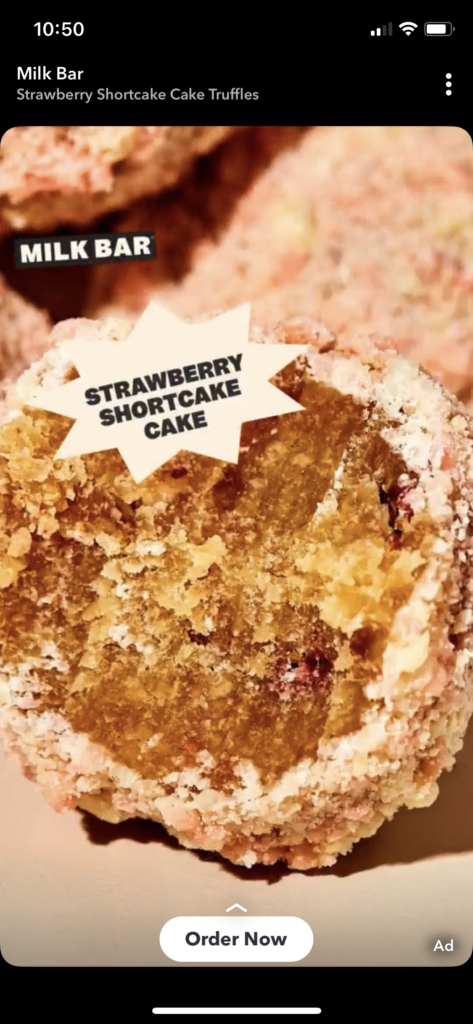
This article—despite all the above angst—came together rather organically. For whatever reason, Milk Bar targeted you with their advertisements on social media. Frankly, the ads started to annoy you, and—in what has become a favorite pastime—you dove into the posts’ comment sections in search of solace. Surely, you thought, some other customers had sampled the goods and come to the same conclusion regarding their surfeit of sugar. What you found, instead, were the markings of a dysfunctional fulfillment system that had been ruining birthdays and holidays nationwide for months.
While the bulk of Milk Bar’s social media engagement is of the standard, empty sort—that is to say, countless iterations of “omg that looks so good!!!!”—you noticed an undercurrent of criticism being levied in many of the brand’s most popular posts.
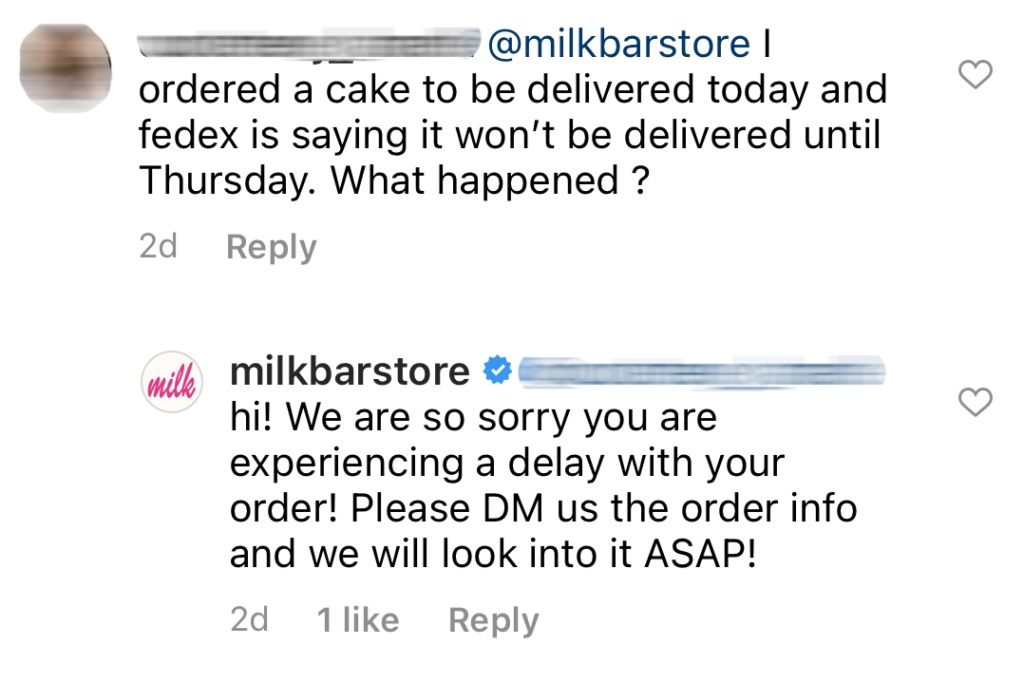
The customer feedback started innocently enough. The deluge of online ordering throughout the pandemic has, naturally, caused delays with carriers like UPS and FedEx. Goldbelly, which handles a sizable volume of perishable shipments coming from every corner of the country, has faced typical delays of a day or two. In response, the company has instructed their partners to prepare packages—despite being handled exclusively via one-day or two-day transit—to withstand extra travel time. The addition of extra ice packs and insulated containers have done enough, you have found, to salvage delayed shipments. Nonetheless, Goldbelly is quick to offer full refunds for orders that arrives in subpar condition.
Milk Bar’s response to the above customer is competent enough. Getting a company’s “attention” on a public forum is usually enough to ensure any problems are handled. Though you would think commenting on a brand’s social media posts is something of a last resort (or a means to secure “freebies”) when compared to a company phone number or e-mail account dedicated towards customer service.
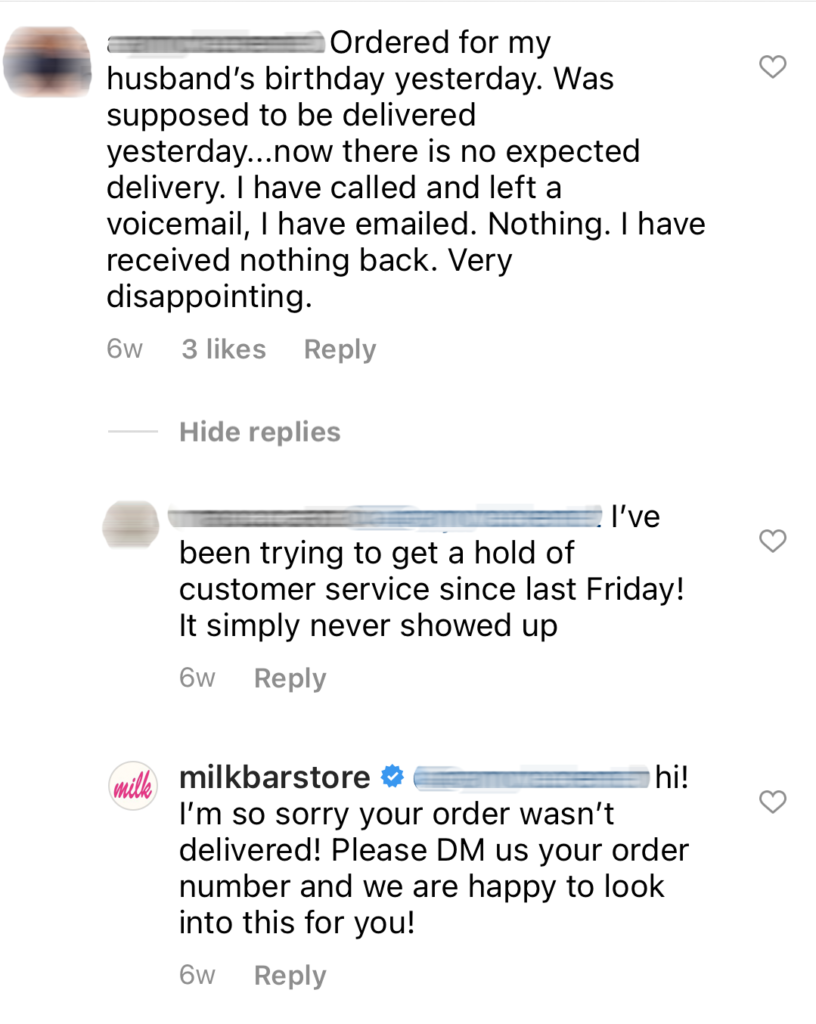
The above messages seem to confirm that Milk Bar’s customers are drawn to air their grievances on the company’s social media posts due to a lack of response via other channels. These two commenters seem to confirm that this lack of response persists across various media (phone and e-mail) and over the course of time. Meanwhile, Milk Bar’s response to the customers’ concerns begins to seem a bit trite.

While it is somewhat unclear just how long the second commenter in the previous post had been waiting since “last Friday” for a response, the above post alleges that Milk Bar has ignored customers for “over a month.” This particular individual also points to the company’s failure to respond to their concerns via e-mail, phone, or Instagram messages. Given that the brand’s social media account directs critics to message their order details through Instagram, it seems that Milk Bar’s idea of “customer service” is wholly reactive. They seek only to minimize any damage caused by disappointed patrons rather than proactively manage their feedback when it is first received.
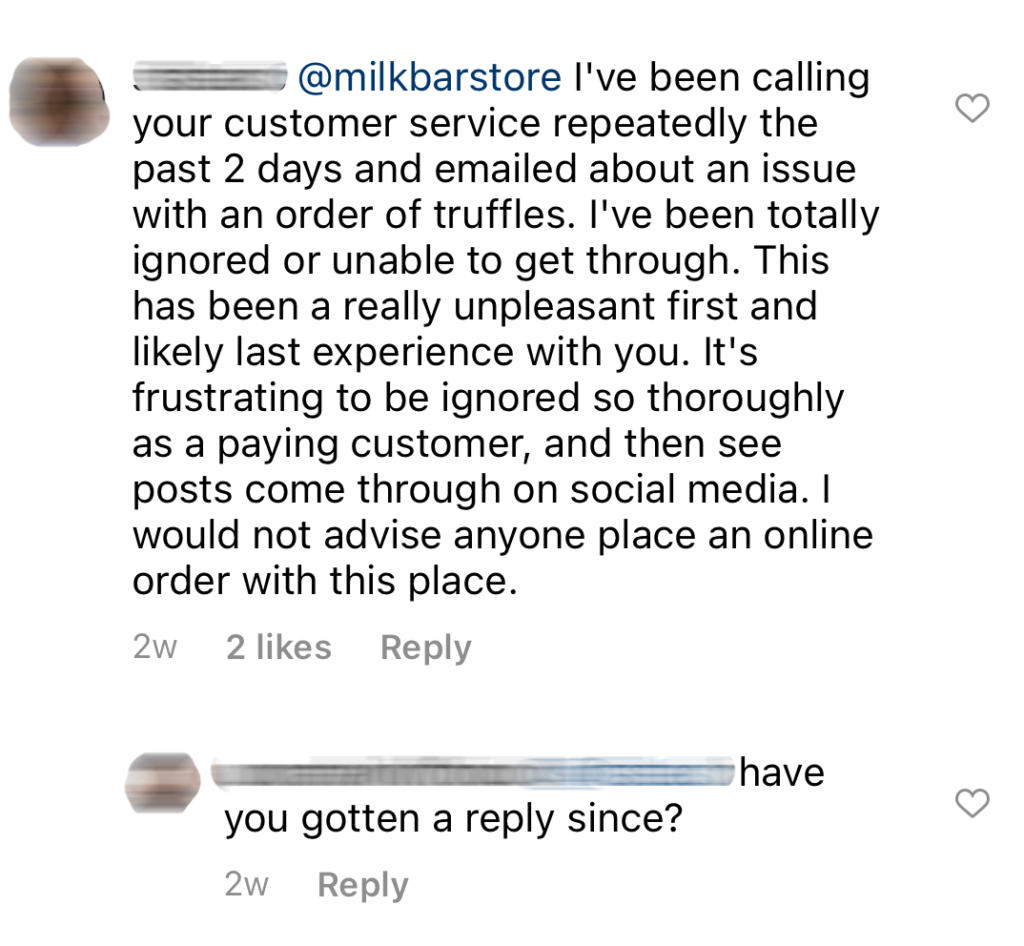
The customer above—who claims they have called Milk Bar’s customer service “repeatedly” over the course of two days (and sent an e-mail)—notes the irony of the brand’s active, eye-catching social media promotion. What could be worse than being served targeted ads to buy more shit from the bakery that failed to deliver or even field your complaints? Talk about twisting the proverbial knife!
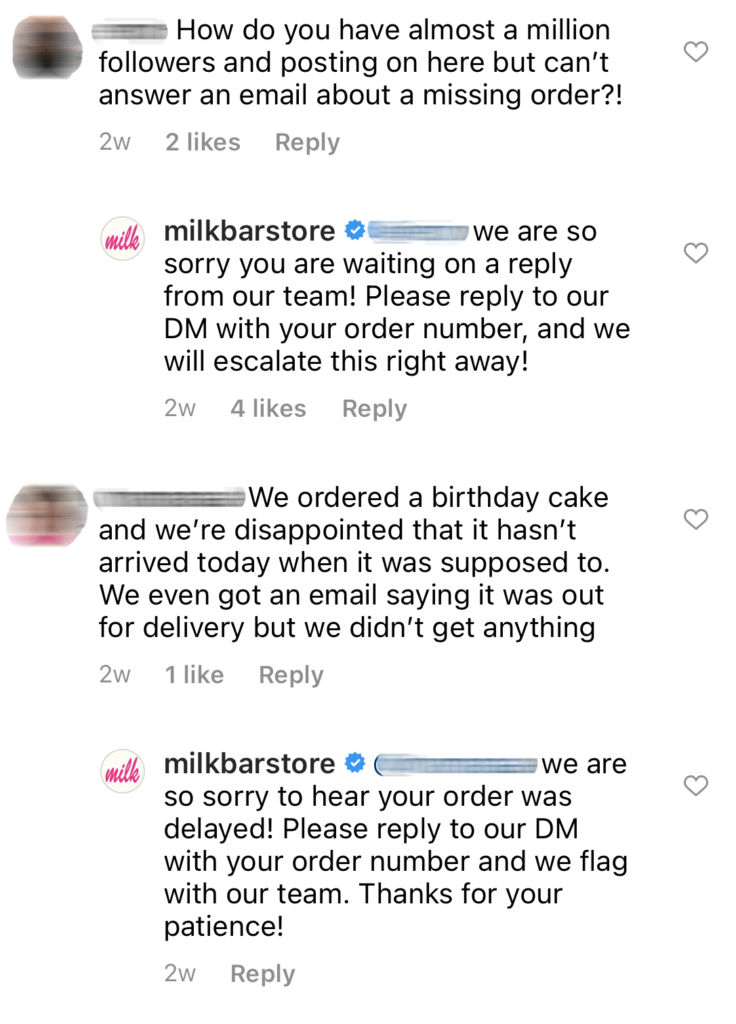
In this image, the first customer—once more—embodies the bitterness felt as the Milk Bar “lifestyle brand” charges ahead with its scheduled social media posts while ignoring the paying customers who, perhaps, responded to that very same sort of content initially. Here, we can also see how Milk Bar’s social media account uses variations of the same script to pacify critics. While the liberal use of exclamation marks looks to impart some sense that customers’ concerns are taken seriously, the preponderance of similar responses reflects a company that is in over its head.
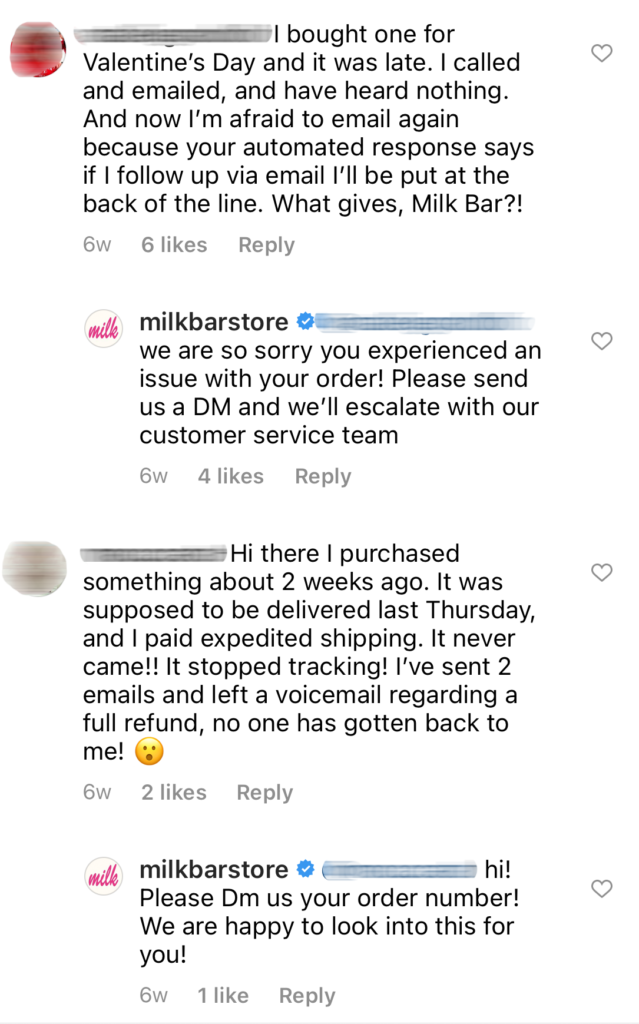
Here, in addition to the typical complaints about delayed or missing orders and a lack of response from Milk Bar’s customer service team, we learn of an additional worrying detail. The brand’s e-mail account—which many commenters contacted before turning to social media—apparently warns against sending follow-up messages. By telling customers that any additional e-mails will place them “at the back of the line,” Milk Bar seems to say that they will, eventually, respond and make things right with a bit of patience.
Given that one commenter revealed they have waited “more than a month” for a response—not to mention the great number that have taken to social media after receiving no response via other channels—it is fair to say that this “back of the line” threat is merely a form of obfuscation. Milk Bar looks to blame disappointed patrons for their impatience while the real problem, it seems, lies with a dire lack of adequate staffing (or, of course, the company not giving a damn about customer service to begin with).

As mentioned before, delayed packages are simply a reality of the pandemic. Milk Bar may provide customers with expedited shipping options, but, once the package has been tendered to a carrier, it is subject to the larger realities of FedEx and UPS’s logistics. Goldbelly has smartly warned customers to choose delivery dates that are one or two days prior to the date an item is needed. Dominique Ansel Bakery—which has been shipping its Cronuts nationwide—has taken upon itself to deliver items a day early (without customer consent) in a bid to play it safe. Annoyingly, this has meant you have had to freeze your Cronuts—which are meant to be eaten the day they arrive—in a bid to preserve them until your original, chosen delivery date. But you suppose day-old Cronuts are better than no Cronuts at all!
The above comment reflects some of the emotional stakes involved in ordering these Milk Bar items. A mother looked to make her son’s birthday special, likely paying the premium rate for a Saturday delivery, only to see the order delayed and held through the weekend. In this case—relative to the realities faced by the shipper—there is little Tosi’s business can do. If they shipped the package on time and it faced an unavoidable delay, Milk Bar can only—like Goldbelly and Dominique Ansel—ensure their customers choose a delivery date prior to when their item is required.
Of course, it goes without saying that a polite, responsive, and generous customer service department would go a long way towards soothing patrons whose special day is being ruined by the caprices of opaque shipping companies.
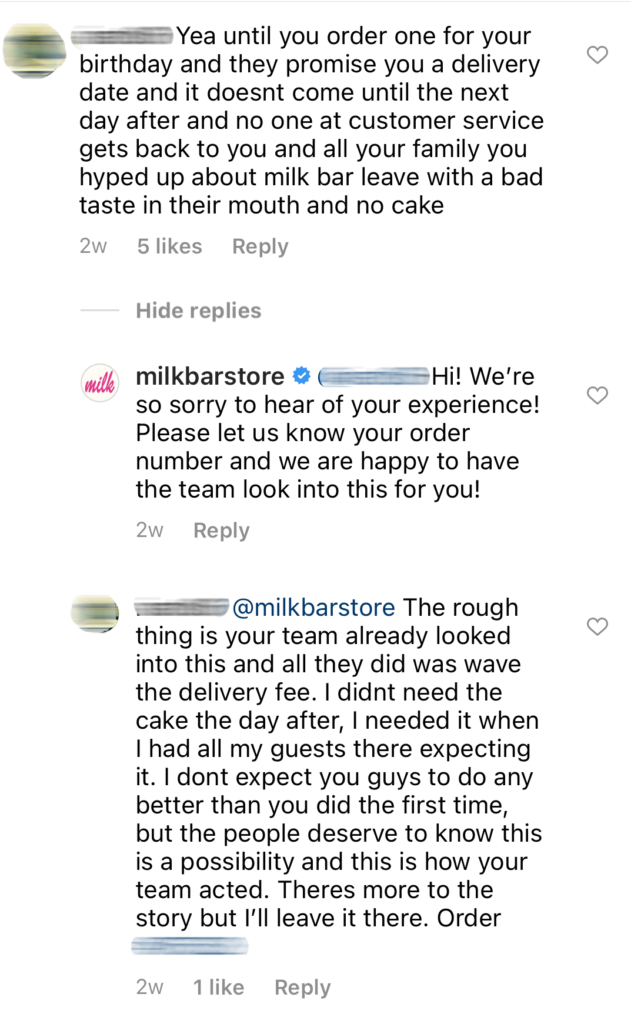
Here, we see yet another Milk Bar customer whose special day was deflated due to a delayed cake. Though Tosi prominently advertises “next day delivery” for her processed (mass produced and filled with preservatives) products, receiving the package “the next day after” is surely within the realm of possibility.
Nonetheless, a party without a cake—a “coveted” Milk Bar creation, mind you—simply feels naked. When a date has been set, the guests have arrived, and the expectation has been built that they are about to sample a slice of something extra special—only for that “next day delivery” to be lost in some logistical nebula—“a bad taste in their mouth” is sure to follow. It’s an embarrassing reality to face as a host, and there exists an all-too-natural urge to unleash one’s angst on whoever is responsible.

In all likelihood, that would be the shipper. And you think everyone knows by now that FedEx and UPS will happily tell customers to go pound sand. Milk Bar, as you have mentioned, would do well to warn would-be orderers to allow for extra time in transit. Even just one extra day’s allowance, in most cases, would mean the difference between a successful and a spoiled special occasion. We know that the cakes—with ingredient lists a mile long—aren’t going to degrade in “quality.”
But would such a disclaimer stand in the way of Tosi maximizing her sales? For “next day delivery” appeals to a certain segment of the consumer population that either procrastinates or purchases items based on impulse. Would they have placed their order without the promise that it would arrive at their doorstep posthaste?
Of course, when everything falls to pieces and the special occasion ends in failure, Milk Bar customers are left angry and ignored by customer service. Those who do get a hold of them—eventually—have their delivery fee waived and nothing more.
(Of course, Tosi’s bakery is careful to clarify—in the fine print of their FAQ—that they “do not offer refunds for delays caused by one of our shipping partners due to weather, mechanical error, strikes, natural disaster, inaccurate shipping information, mistakes on the part of our shipping partners’ employees or similar reasons that are outside of our control”).

While the previous customer was left nonplussed by a delay of a mere day, the commenter above is contending with an order running at least three days late. It seems they were able to contact Milk Bar’s customer service in some capacity—who proceeded to offer them a “$10” credit or refund—but the package remains missing.
Milk Bar’s FAQ states, “in the event of a delivery delay two or more days past your scheduled delivery date for an order containing cake, pie, and/or truffles, please dispose of or refuse delivery, as it will no longer meet our standard of quality and freshness for your enjoyment.” So why are they throwing around piddly sums like $10?
This user’s predicament is clearly grounds for a prompt, full refund. Whatever grotesque margin Milk Bar makes on their concocted cakes can surely withstand a bit of generosity. As the customer said, the occasion for which the order was placed is long gone. Tosi can point her finger at the shipper, but her patrons are paying premium prices for something more than sorry excuses. They trust the “James Beard Award winning pastry chef” to sweeten up a special day, and, by all accounts, they compensate her and her team well for doing so.
Milk Bar must take greater ownership of the manner in which they transport their goods—whatever sort of contracting is required. They can hide behind shippers as a means not to offer refunds if they like, but, once orders are being delivered past the point of “freshness,” it does not suffice simply to refund a token shipping charge and try again. For these cakes are purchased—at exorbitant prices—as capstones to a singular occasion. That is what Tosi must satisfy—not simply shoving shit in a box and releasing it out into the world with no care for the symbol, to each and every individual hosting a party, it represents.
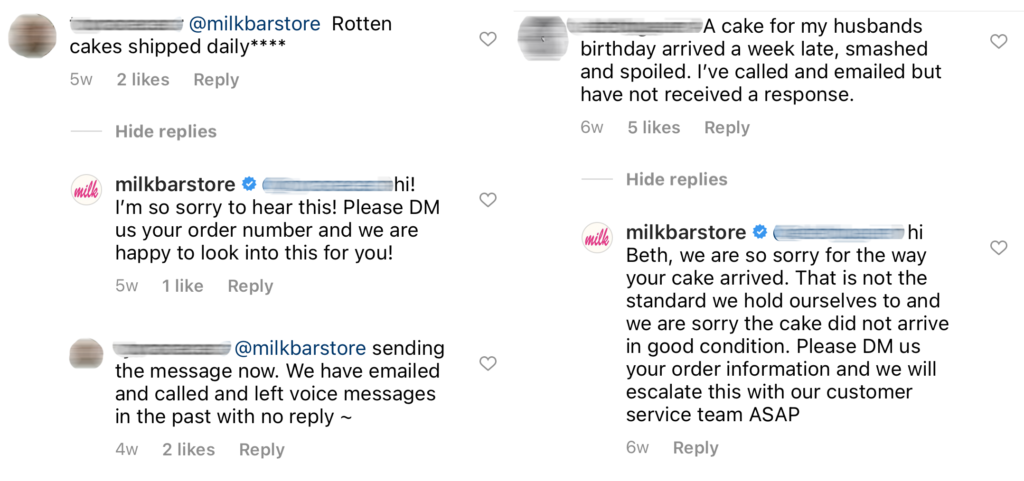
Otherwise, as the above comments attest to, Tosi’s reputation will change from being a purveyor or overpriced, sickly sweet crap into some sort of baking Grim Reaper that sends malformed and rotten cakes throughout the land. Despite their brave social media intern claiming “that is not the standard we hold ourselves to,” it seems that Milk Bar doesn’t, indeed, have any standards at all.
And think of all the food waste! Of course, it is just sugar and flour (and preservatives), but surely Tosi feels some shame for shuttling wasted ingredients around the country that could be put to use feeding the many who have been disadvantaged during the pandemic.
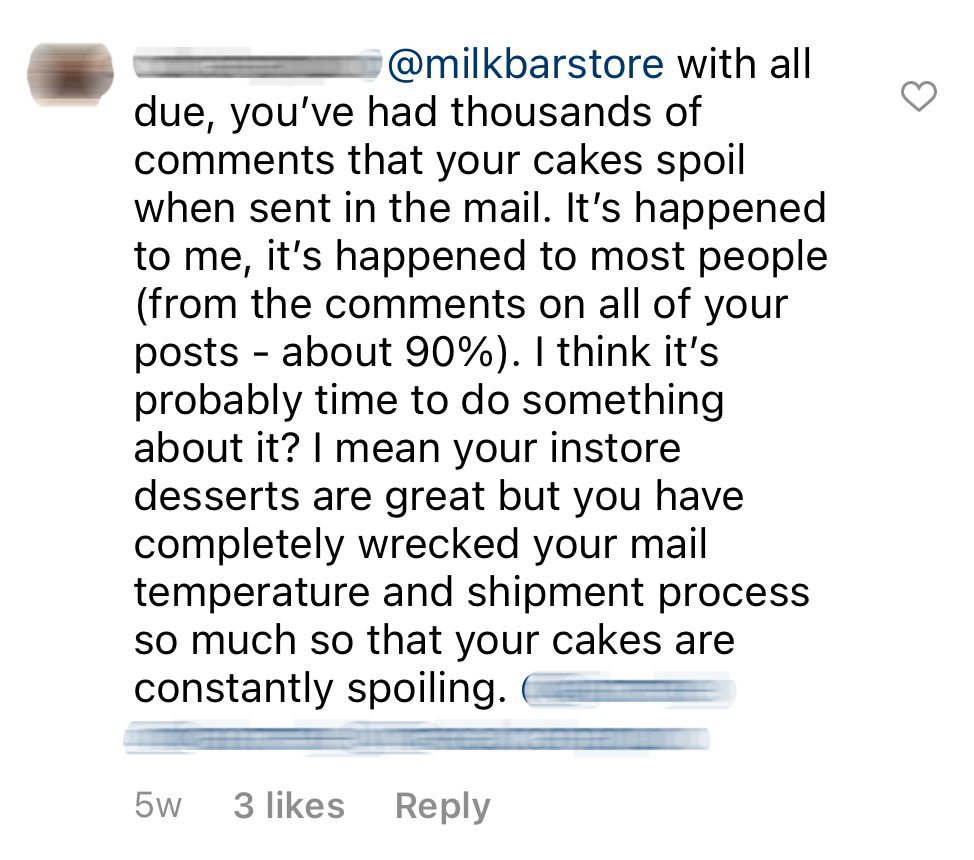
The above commenter spells the situation out rather clearly, saying what we’re all—no doubt—thinking. Why does Milk Bar continue to accept customer orders, ignore providing any kind of response when those customer voice displeasure at delays, and merely look to manage the fallout on social media? How is Tosi comfortable signing her name onto so many ruined birthday parties, so many rotten cakes, with no sense of urgency to make things right by consumers other than laundering her reputation and ensuring the steady stream of suckers doesn’t stop?

These comments—posted, unsolicited, without any relation to any order the user placed—speak to the sort of vigilantism Milk Bar inspires. Having ruined so many special occasions and stoked such bitterness by ignoring customer inquiries—only to offer a paltry refund when they finally respond—Tosi has actually driven her patrons to the point of looking to save others from the same fate.
The user, here, is not complaining. They are not getting personal or nasty or even overdramatic. They are simply sharing what seems to be, increasingly, a simple truth about Milk Bar: they will take your money with little care for you or the occasion that drove you to spend your money on their goods. Tosi will continue to post “lifestyle” content and pimp her wares while denying the humanity of her very own customers, who are seeing the birthdays of their loved ones ruined, in no small part, due to her greed.
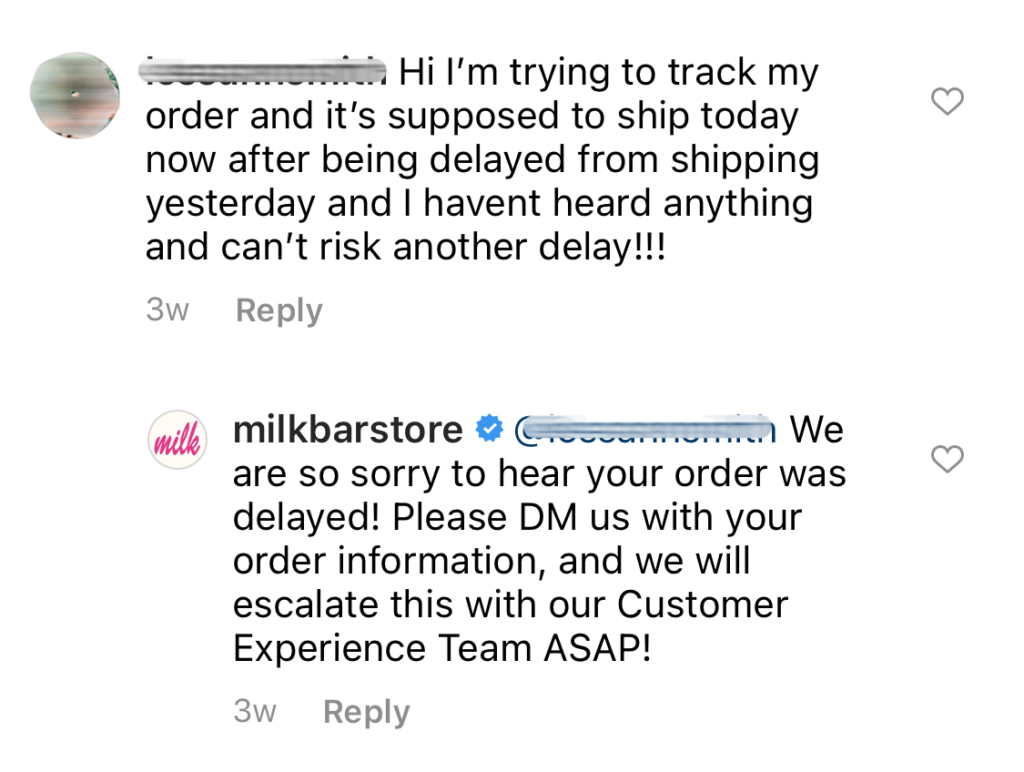
While Tosi casts blame on carrier delays to shield her business from responsibility, some commenters point towards delayed shipping on Milk Bar’s end. Surely, with such pernicious problems affecting their orders, the blame cannot lay completely on the shippers.
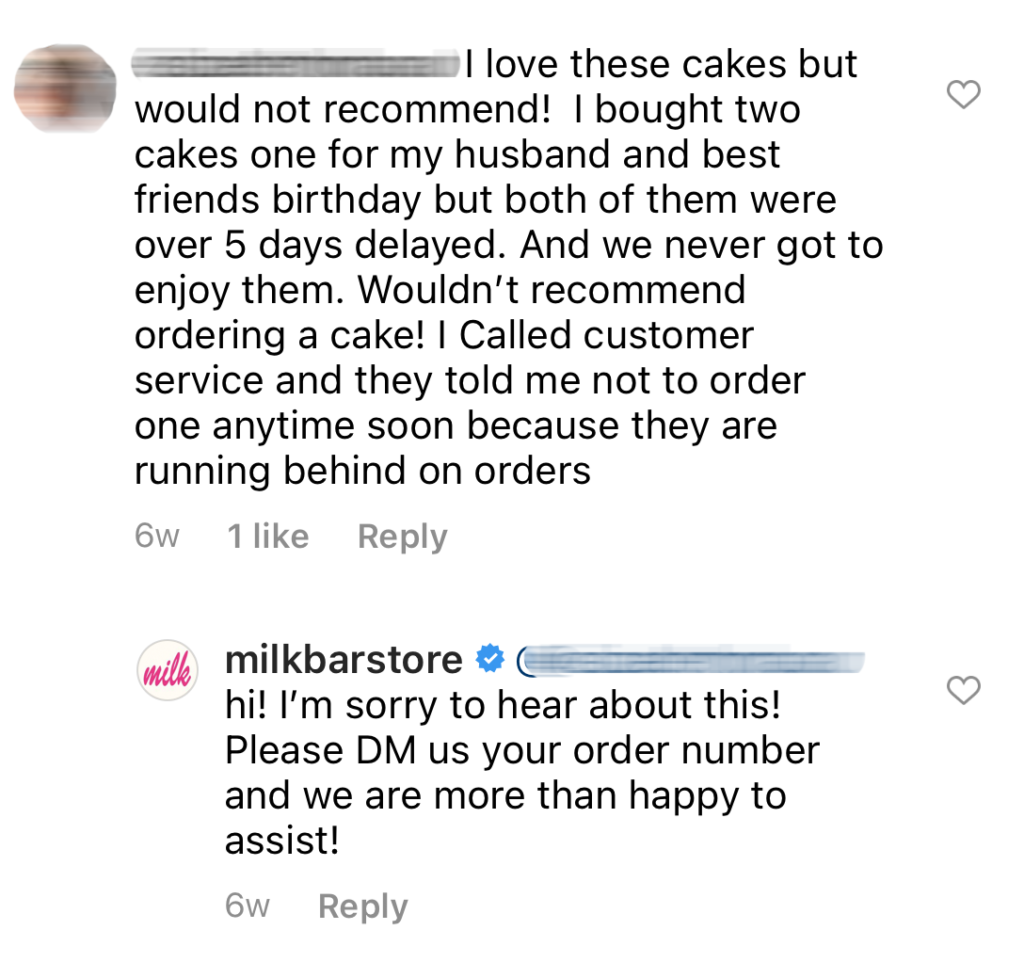
Here, another user reveals that two of their cakes were both delayed more than 5 days—well beyond what Milk Bar itself considers acceptable for “quality.” The most interesting segment of the comment is that this customer was, indeed, able to talk to a real employee over the phone. The Milk Bar henchman—and this is striking—told the caller not to order a cake “anytime soon because they are running behind on orders.”
A bit damning, isn’t it? Milk Bar might hide behind shipping delays, but the reality seems to be that the business just doesn’t care about offering adequate customer service. Blinded by the revenue online orders, throughout the pandemic, have offered her, Tosi has decided to charge full steam ahead—accepting more orders than the bakery can, in good faith, hope to deliver on time.
In doing so, the “award-winning” pastry chef reveals that she cares more about profit maximization than ensuring the sanctity of her patrons’ special celebrations. How can a business that revolves around selling—essentially—the confectionary centerpiece of a party take customers’ money when they know full well they will be unable to deliver in a timely manner? How can they err on the side of ensuring their own sales, rather than securing the happiness of those who have trusted them for one of their year’s most important events?
And, when things inevitably go wrong, how can Milk Bar fail so utterly at mitigating their customers’ understandable anger? How do they struggle to provide even the most basic response (other than boilerplate social media replies)? Why do they think refunded shipping or a $10 credit could ever console someone left without a cake on a birthday?
A one-day delay might be an honest mistake, but three or five days gets to be beyond the pale. It’s a travesty, an unabashed failure, and it makes you ask: why does Milk Bar ship its baked goods nationwide at all? Surely, if the business is struggling so badly to keep up with orders, it can join myriad restaurants and bakeries that have “pressed pause.” Tosi need not even live without her ill gotten gains for long! Just give Milk Bar a week or two to get a hold of what’s going on, to bring operations back up to a standard in which the brand is not reliably ruining customers’ special occasions. Surely, that’s what any leader worth their salt (or sugar) would do.
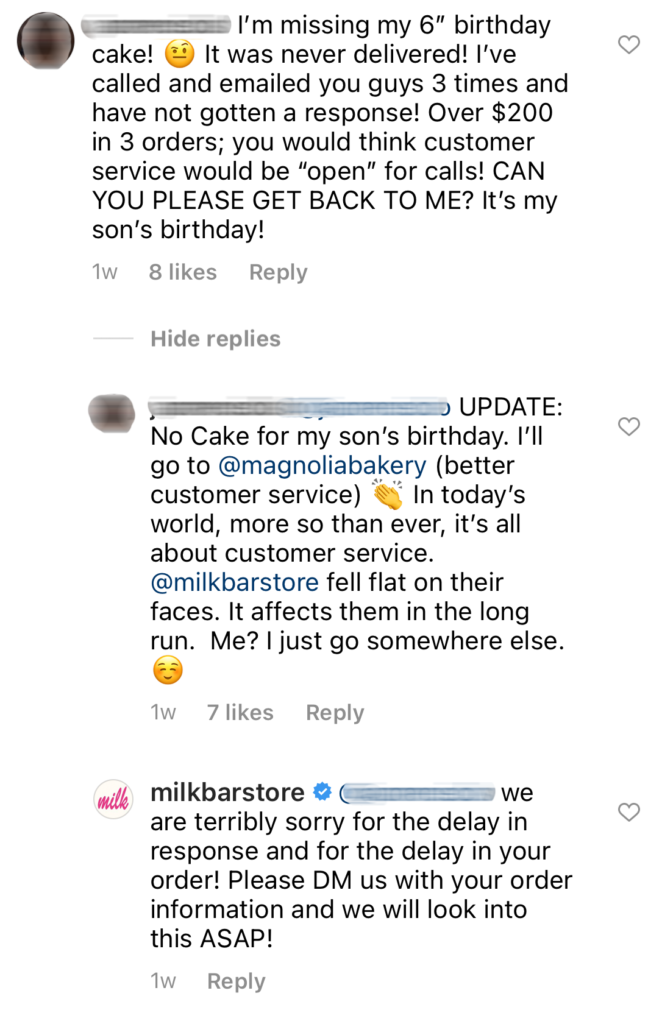
But Milk Bar’s customers, despite the manner in which Tosi treats them, are not stupid. When a business refuses to respond to them across several forms of communication—when the success or failure of their special day hangs in the balance—they do not simply sit around and become the patsies of Tosi’s greed.
Here, one user describes pivoting towards Magnolia Bakery to secure some kind of cake for their son’s birthday. Certainly, you think Magnolia’s items are no better than the stuff Milk Bar slings. However, competent customer service is often all that is required to save the day. For “a cake” is infinitely better than “no cake.” And, even if there was no chance that Milk Bar’s cake would have arrived in time, they could have honestly appraised the situation and enabled the customer to find a replacement. Instead, Tosi seems to tell her customers, “you’re on your own!” But this one was savvy enough not to see their party ruined in exchange for a token refund.
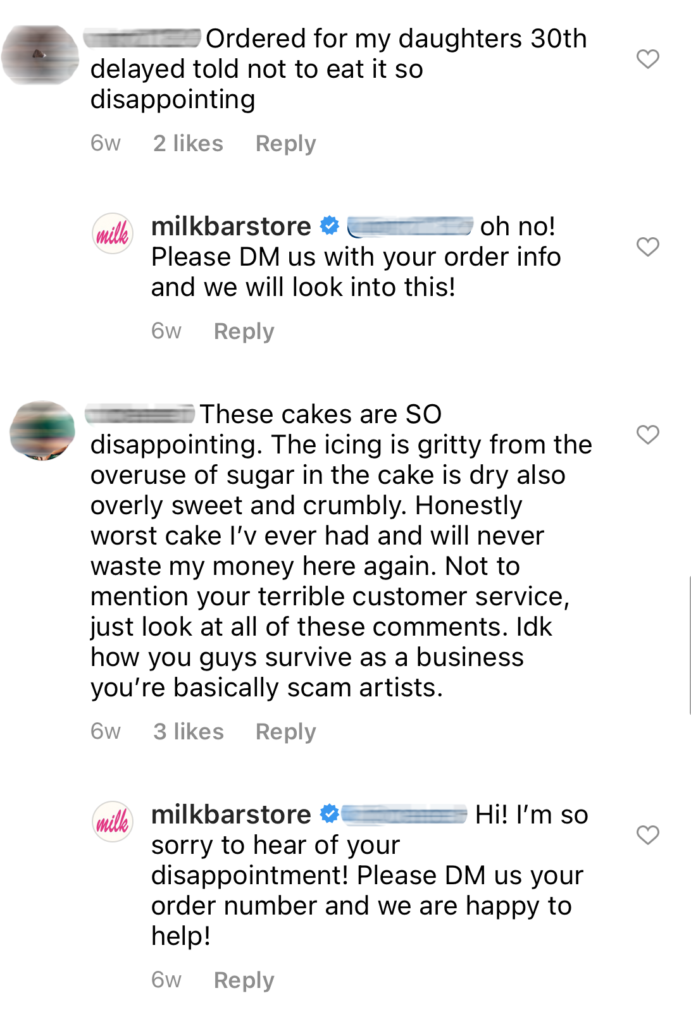
This set of comments features a ruined 30th birthday party—with the incredibly trite response of “oh no!” by Milk Bar’s social media team—as well as a rather cogent criticism of the bakery’s cakes in technical terms.
Most interesting is the second commenters terming of Milk Bar as “scam artists,” a moniker that reflects the brand’s failure at so many levels of the guest experience.
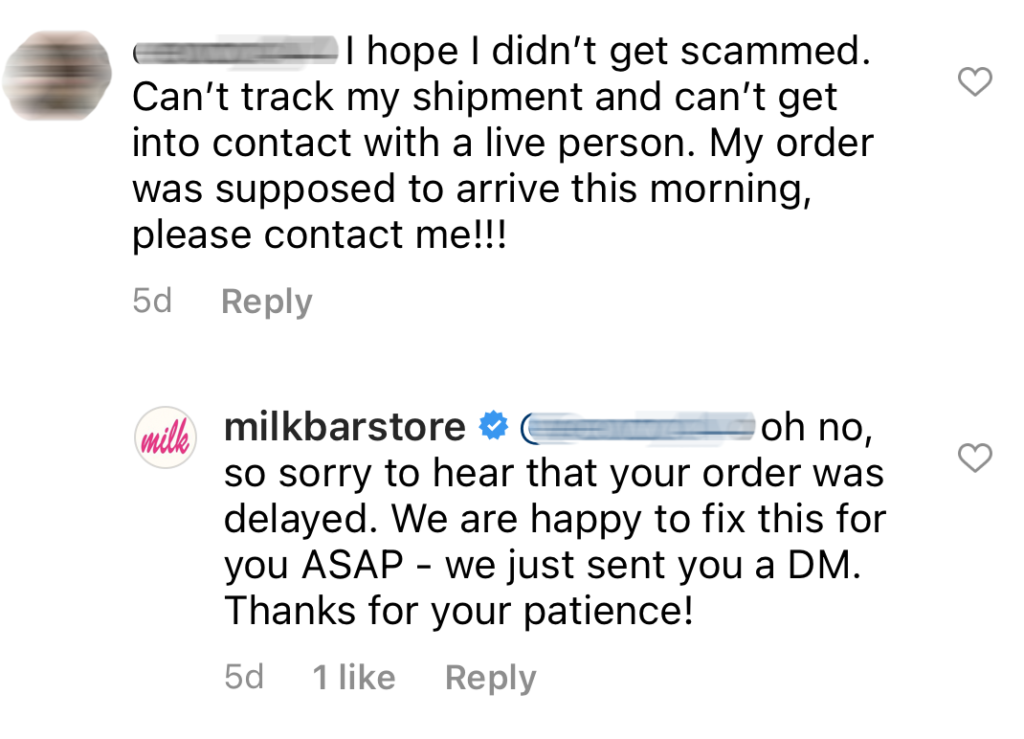
While this commenter is concerned about an order that was supposed to arrive that very day (oh, how naïve, try waiting five days—or a month!), Milk Bar’s atrocious customer service has left them wary that they were “scammed.” In some sense, such a concern is foolish. However, the combination of expensive pricing, lamentable customer service, and an unexpected delay is enough to make one wonder what, if anything, they paid for.
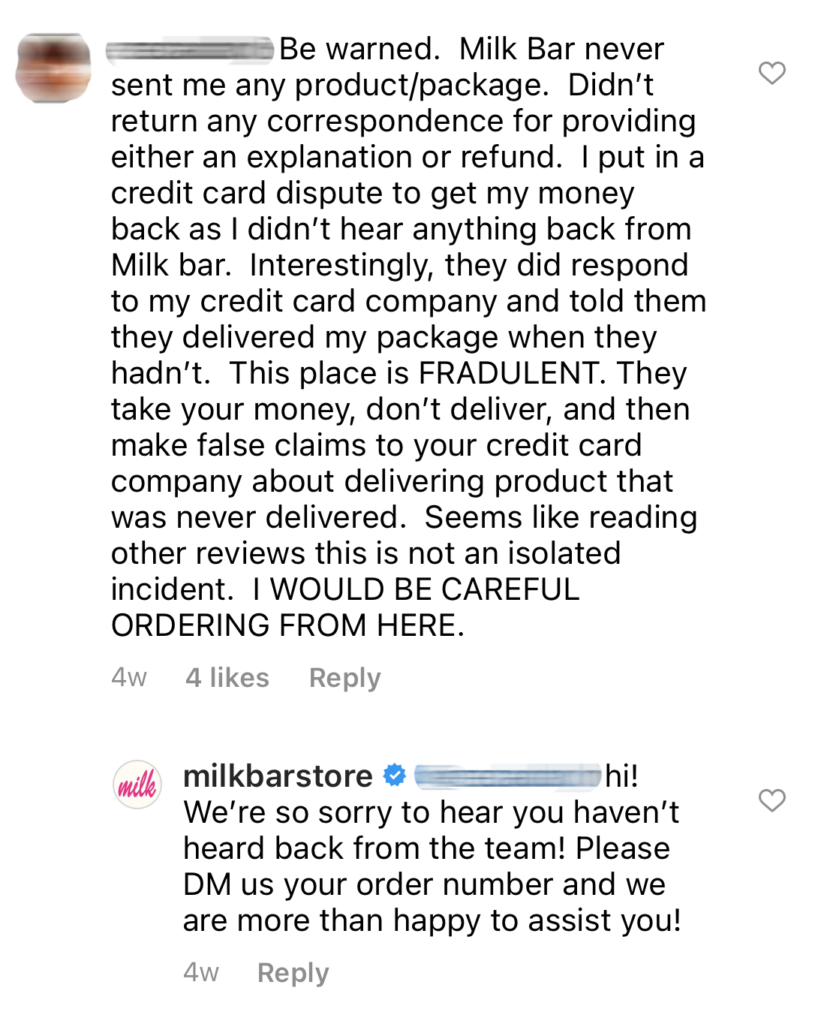
Out of all the comments you came across, this must be the most egregious. While, up until this point, one could cast Milk Bar as a business that is merely overwhelmed, this user’s experience illuminates, most clearly, Tosi’s priorities.
Though Milk Bar refuses to respond to customer inquiries regarding their delayed orders (let alone apologize, offer an ample refund, or otherwise make things right), they have the time to fight credit card disputes (and do so without any regard for the facts of the claim).
How tone deaf and utterly greedy can Tosi be? How has such a plan of action, such a manner of operation, come to be instituted? And could the response from Milk Bar’s social media team—which, quite sadly for the poor soul manning the accounts, is left to pick up the pieces—be more limp?
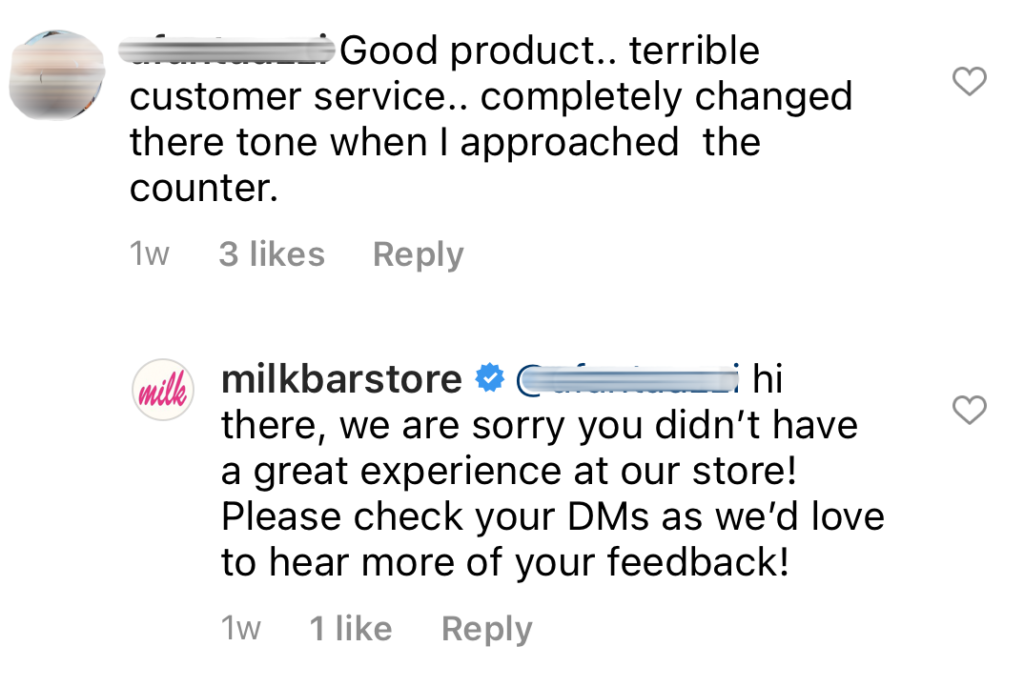
Few of the comments you found referred to the Milk Bar “in-store” experience, but you think this one merits mention. Given the disdain Tosi feels for her online customers, would it be any surprise that her staff shows disdain towards those who join them in person?
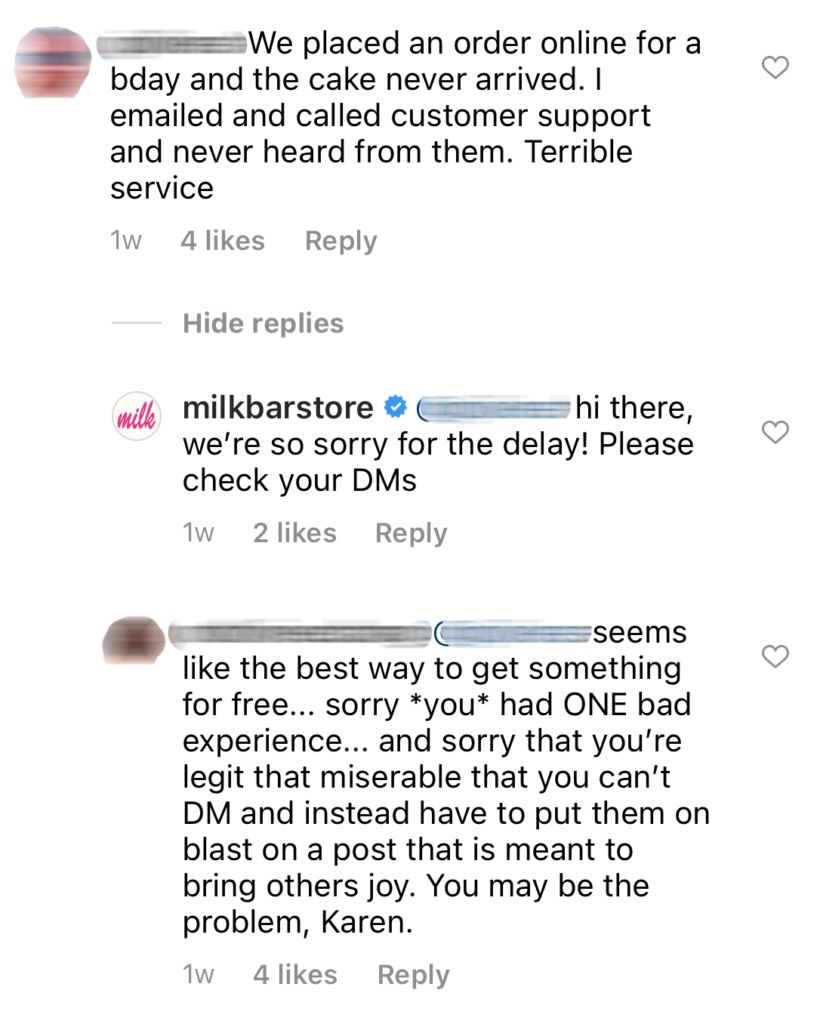
Lastly, just as a bit of a curiosity, you present an exchange in one of the comment sections. User 1 shares what has become, sadly, a typical story of a missing Milk Bar cake. The brand’s account responds in their typical, boilerplate fashion. But, instead of—as is also typical—receiving consolation from another aggrieved commenter, User 1 actually finds themselves accosted.
User 2 brands User 1 a “Karen” and looks to defend Milk Bar’s “honor,” the former seemingly unaware that User 1 is speaking to pervasive and longstanding problems that have affected a wide range of customers. User 2 is offended by User 1’s use of the comment section to command the bakery’s attention, even though countless customers have found this venue offers their only chance at receiving a response. Unaware of the larger context but totally sure in their righteousness, User 2 whines that User 1 is detracting from “a post that is meant to bring others joy.”
Never mind that User 1 was left without a cake for their birthday. Where was the “joy” then? User 2 thinks that User 1 is after “something for free” when the latter, truly, only wants what they originally paid for and were denied—at the additional cost of spoiling their special occasion.
User 2, you think, is the sort of Milk Bar “lifestyle” consumer Tosi has tried so hard to cultivate. It’s a population of cultists who will defend the brand against any accusations of malpractice. It’s a group of people that, for whatever reason, feels a connection to Tosi and cannot stand to think she is anything less than the “award-winning pastry chef” she presents herself to be.
Has User 2 ever ordered from Milk Bar before? Have they ordered online with the expectation of receiving a coveted cake for a loved one’s birthday? Have they seen that order delayed not one day, but three or five or even a full month? Has User 2 tried to contact Milk Bar’s customer service by phone and e-mail over the course of several days with no response? Have they endured Milk Bar’s lack of response only to see the bakery fight their credit card dispute on a package that never arrived?
What possesses someone like User 2 to defend a pastry chef and a business that has wronged so many average consumers? What pride can they feel for a brand that does not even know they exist?
At whatever point in the not-too-distant past, Tosi decided she’d rather develop a cult of personality than devote herself to her craft. She chose a superficial, fleeting fame—and the quick profits that follow from such—over any assurance of quality. She prostituted both her and James Beard’s names to ultimately ruin Americans’ most treasured moments with absent or rotten cakes.
In Tosi’s own words, “at Milk Bar, we believe in the transformative power of a really freakin’ good cookie or an outstanding piece of cake. And we consider NO occasion at all, to be a perfectly valid occasion to celebrate yourself or someone else.” Self-admittedly, the brand is “not big on feeding the hype beast,” but what leg do they have to stand on if not hype?
How can they claim to “transform” anything, these days, except birthday parties into utter disappointments? You can forgive Tosi for sticking by the sickly sweet style that has sold so well, but, when compassionate customer service goes out the window, it is right to ask just what good Milk Bar is doing for consumers.
It is right to ask: what the hell is going on with Milk Bar?
Despite all of the above testimonials, you would hesitate to label Milk Bar “fraudulent.” Surely, someone, somewhere is receiving the goods they paid for in due time. However, you think without any doubt that Tosi’s identity is fraudulent.
She may paint herself as the “pastry chef next door,” as a James Beard Award winner, or simply as a pleasant woman and mother through her media appearances. But Tosi is nothing more than a cynical businesswoman willing to cut corners so long as it expands her “empire” and pads her pockets. She is content to sell you disgustingly sweet cakes that never arrive, to ruin your special occasion, to ignore you, and then, at last, to offer you nothing more than a pittance for all your trouble.
You can understand those consumers who might get confused, who might think a Milk Bar product stands for some sort of craftsmanship or comes, in any way, shape, or form, from Tosi’s hands. They are sadly mistaken. These days, cake is nothing but a commodity to Tosi. The only thing “transformative” about it is how it transforms suckers’ money into her own gains.
And the deepest irony of all: while Tosi’s husband galivants on stage in Chicago and lectures us about “hospitality,” Tosi herself is shipping rotten cakes throughout the country, ignoring customers for weeks on end, and quixotically fighting credit card disputes. While Tosi’s husband speaks on how to make the “guest experience” magical, Tosi has done more to ruin her guests’ birthday experiences than perhaps any pastry chef alive.
Chicago will not in any way benefit from a Milk Bar location. Such a travesty would only serve to steal business away from the city’s many independent bakers and businesswomen who do, in fact, deliver exceptional products and compassionate service each and every day.
Milk Bar, in its current, dysfunctional state, is nothing but a scourge to the American food system. It snares consumers with style over substance, fails to educate them in any manner of pastry appreciation, and, ultimately, leaves them high and dry with neither cake nor money. You hope you have given some voice and sense of permanence to the many complaints of consumers whom have been wronged by Tosi’s lust for profits.


